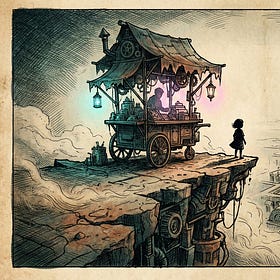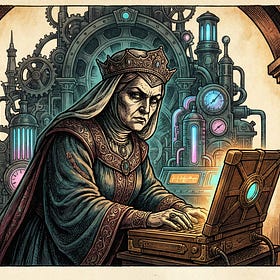Why AI Agents Fail: Everything Looks Great When You Don't Know What You Want
AI Agents Suck at Handling the Human Experience. So Much for Agentic AI (for now).
AI Agents Suck at Handling the Human Experience.
So Much for Agentic AI (for now).
AI influencers love showing off their latest AI agent experiments. "Look at this! ChatGPT Operator autonomously booked my flight and hotel! Pure magic! Clearly, AGI is nearly here!"
Yeah, right.
As usual, they gleefully ignore life's many confounding nuances. AI agents suck at handling human experience.
You see, it's tricky to outsource work to AI agents when you are genuinely passionate about something, or when you are deeply invested in the outcomes. You simply cannot trust an AI to handle the intricate details of the work because, frankly, you care too much.
Take my business travels, for example:
I'm privileged that I can choose between three international airports: Amsterdam, Rotterdam, and Brussels. The best flights for me depend entirely on whatever else life throws at me in a week. Hosting friends for a weekend in Brussels? Then traveling via Brussels makes the most sense.
Sometimes, trains are superior to planes, particularly for destinations such as Paris or Frankfurt (when traveling from Belgium or The Netherlands). When I'm heading to London or Berlin, I'll take the train if the tickets aren’t too expensive. But southern France through Paris? I'd rather pull out my own fingernails than dive into the nightmare of the Paris subway between Eurostar and SNCF.
With airline choices, I prefer KLM or other Skyteam members because of their loyalty program, but Lufthansa and British Airways can still tempt me with lower fares and better flights. Sure, I'll grumpily pay a little extra to get my much-coveted Flying Blue miles, but not at the expense of my bank account—or half a night's sleep.
Speaking of sleep, I absolutely refuse getting out of bed before 5 am or arriving after midnight. However, my ironclad rule mysteriously softens when confronted with absurd midday ticket prices, or when I need to get back home in time for a critical life events like a wedding or a birthday party.
Layovers require strategic planning, too. Zurich, Munich, or London transfers are fine. Bring them on. But I say, "No, thank you," to Paris (CDG) or Frankfurt (FRA). One is clearly designed by a sociopath, and the other is a bus terminal masquerading as an airport. I avoid them whenever possible.
There's nothing simple when it comes to payments, either. I juggle at least four credit cards and six bank accounts, each assigned based on the trip's business or personal purpose, the proper legal entity, any invoice requirements, and whether my spouse tags along.
When it comes to seat selection, I usually prefer a window seat near the front, but it's not important enough to pay any extra charges. Unless, of course, a short layover is involved—then an aisle seat and quick-exit surcharge suddenly become a necessity.
I also scoff at the suggestion of AIs autonomously booking my hotel rooms. I don't care about the amenities of the room. Don't make me laugh. What's crucial is the proximity of the hotel to my event venue—a maximum 20-minute walk, please—unless the venue is inconveniently located outside the city center—then having a bunch of good cafes and restaurants nearby becomes paramount. I'll take a taxi to the venue.
I always check hotel ratings and reviews. An accommodation with a 9+ score on Booking.com intrigues me enough to test the hype myself, but only within limits and depending on the duration of my stay. A premium price for a quick overnight stay is usually not worth the expense.
As a digital nomad, four-star hotels are my standard because I need a lounge to work and relax comfortably. Unless a local Starbucks, Espresso House, or Caffe Nero near the hotel stays open late—then I don't need a lounge and an upscale three-star boutique hotel will suffice nicely.
Occasionally, apartment hotels offer affordable comfort. However, they're an absolute "no" if I arrive late (needing a staffed reception) or when I depart late (requiring luggage storage). It’s all about logistics. I don't want to wait for owners to bring apartment keys or to prowl around a city carrying my luggage.
Why AI Agents Can't Navigate Human Preferences
I've been traveling for 30+ years. I've had all the troubles one can possibly imagine. By now, I know exactly what I want and I could go on for another few pages. Honestly, my travel preferences have evolved into a body of knowledge that could rival an EU Commission Directive. And I haven't even discussed my demands for trains (few transfers between trains but absolutely no coffee onboard) or taxis (Uber, Bolt, FreeNow are the default, unless a line of traditional cabs is waiting right in front of me).
Pre-Covid, when my schedule was chaotic, I had a human assistant providing me with travel suggestions. But even then, total autonomy was off-limits. How could he possibly be aware of a Brussels airport maintenance schedule or a family commitment in Rotterdam? Every booking needed my personal sign-off.
Now my travels are simpler, and I just handle everything myself. Could I train an AI agent to understand my long list of quirks? Possibly, with great effort and endless irritation. But do I want to? Probably not—because no agent could ever navigate my peculiarities better than I do. And I secretly enjoy the work.
I’m a seasoned founder, intrapreneur, and former CIO who builds maps and models for Solo Chiefs navigating sole accountability in the age of AI—informed by plenty of scar tissue. All posts are free, always. Paying supporters keep it that way (and get a full-color PDF of Human Robot Agent plus other monthly extras as a thank-you)—for just one café latte per month. Subscribe or upgrade.
AI Agent Hype vs Reality: When Users Don't Know What They Want
So, whenever an AI enthusiast triumphantly boasts, "My AI agent generated a full startup marketing plan in mere seconds!" or "Our AI autonomously schedules our entire team calendar!" or when they celebrate a fully automated vacation itinerary, I simply roll my eyes.
They're probably happy because they haven't a clue about the complexity of human needs and desires.
When you don't know what you want, everything looks great.
For now, AI agents will suck at handling the human experience.
Jurgen, Solo Chief
P.S. What's your AI automation horror story? I bet you have one.
The Tragedy of the Agents
Clayton Christensen’s framework lives inside Claude now. I don’t even need to understand it.






The article is thought-provoking, particularly with its great tagline: "When you don't know what you want, everything looks great." However, the conclusion that AI is inherently bad doesn't quite resonate. It seems that anyone – like the personal assistant described – would find it difficult to navigate human experience without knowing what the person actually wants.